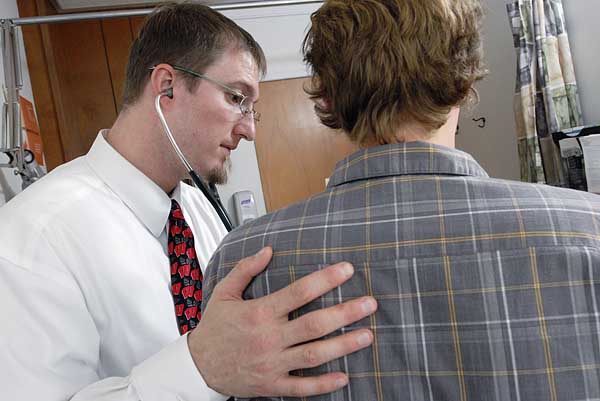Jan. 27 a group of frontline nurses proposed a $30 million program to support the mental health of healthcare workers undergoing increased levels of stress during the pandemic.
The program, titled “Healthcare Workforce Trauma Recovery and Training Program,” would include no-cost mental health counseling and continuing education for healthcare workers.
Nurses presented this program to the Health and Human Needs Committee of the Dane County Board of Supervisors. In addition to starting the program, they hope to assemble a group of representatives comprising of frontline workers, employers and Dane County officials, registered nurse and member of the proposal team Justin Giebel said.
This group would examine problems the county is facing, then design and implement solutions, according to Giebel.
“I don’t know that it’s ever been done,” Giebel said. “Really, we just want to make sure that we’re getting all of those three groups all into the same room at the table. Whatever solutions they come up with can take a lot of different shapes.”
Giebel started his career as an RN in late 2019, so almost all his work took place during the pandemic. Forced into stressful situations early on in his career, Giebel had to take care of patients he said he didn’t feel ready to treat.
Some of his more experienced coworkers told him that these are the sickest patients they have ever treated and the most death they have ever seen, Giebel said.
Giebel referred to the start of his career as a “baptism of fire.” There weren’t — and still aren’t — enough resources available to help him and his coworkers deal with the stress Giebel said.
“A nurse I know reached out to the employee assistance program, and they only offer three sessions with a therapist before you’re cut off or have to start to pay for it,” Giebel said. “A lot of the issues that we’re facing, it’s not something that you can negate in three sessions, so it’s going to take a lot more time and commitment … from these assistance programs or from this proposal, hopefully.”
The nurses’ proposal involved testimonials from frontline healthcare professionals as well as results from a survey Elevated Public Affairs & Victoria Research conducted from Jan. 6 to Jan. 10.
86% of respondents experienced stress or trauma due to the pandemic, 72% experienced insomnia and 19% knew a healthcare worker who has considered suicide.
Due in part to these adverse conditions, there will be 10,000 empty nursing positions in Wisconsin by the end of the decade, according to the Wisconsin Center for Nursing.
Having seen these issues firsthand, Giebel was not surprised by the outcomes of the survey.
“As [positive case] numbers go up, anxiety increases because we know we’re going to have to bear the brunt of the … workload,” Giebel said. “You have fears about what’s coming your way and you can’t really do much about it and you’re already short-staffed, but you have people to take care of. It’s something that you’re bracing for impact for.”
Health and Human Needs Committee members are talking to healthcare workers to find gaps in their current mental health resources, according to District 1 Supervisor and Chair of the Health and Human Needs Committee Elizabeth Doyle.
Dane County sets new goals to reduce phosphorus levels in Yahara Lakes
The proposal was helpful for the committee, allowing members to get data and hear testimonies from those directly affected by ongoing issues, Doyle said. But the committee still needs to gather more information.
“I think a lot of us just have an anecdotal awareness of how tough the pandemic has been on healthcare workers,” Doyle said. “So I think [the proposal] was a really helpful concrete first step.”
Issues in the American healthcare system field are not new, but the pandemic exasperated and accelerated them, Doyle said.
The proposal’s $30 million price tag represents an attempt to use federal relief money through the American Rescue Plan Act according to the SEIU Healthcare Wisconsin media advisory. These funds will be used as seed money to create a lasting program that will help relieve future issues as they arise, the media advisory said.
The Health and Human Needs Committee is assessing how much of the ARPA funds are available to be used, Doyle said.
Though all the funding has already been allocated to other areas, those numbers are just estimates until the money has actually been spent, Doyle said. The committee can’t know how much money is available for the new proposal until it gets responses on requests for data, Doyle said.
“I think we’ve really had gaps in people’s ability to sustain working in these different environments,” Doyle said. “The pandemic has really shown a light on these structural issues that really need to be addressed.”


